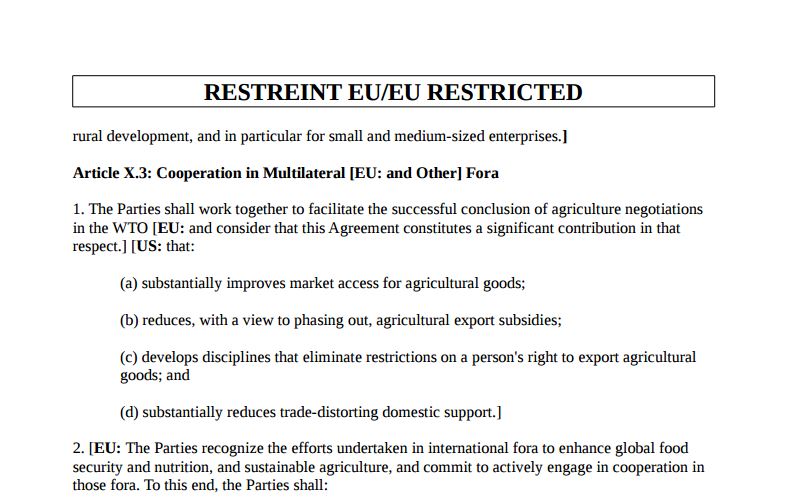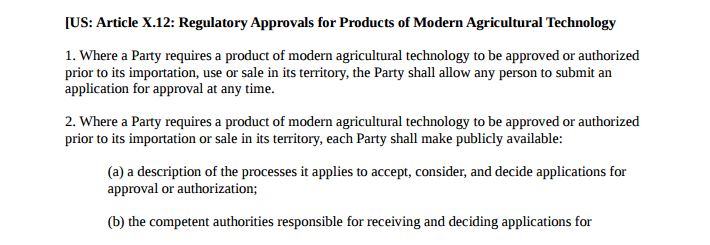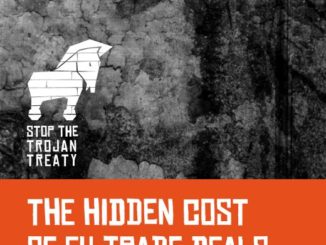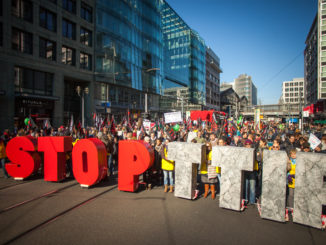Another leak has rocked the TTIP negotiations. The full extent of the demands from the US side for sacrifices to EU standards – especially in agriculture – are revealed. However – and despite the spin – major differences between the two sides are also exposed. Peter Crosskey has the details, with special reference to agriculture.

A massive leak of TTIP documents by Greenpeace Netherlands on May 2 spells out what many people had argued all along. The transatlantic talks have been about handing over power to corporate interests behind closed doors.
- The basic US agricultural wishlist is clearly spelt out:
- Market access (for US hormone-raised meat and end-of-line-washed chicken);
- An end to export subsidies;
- An eventual carte blanche for anyone to export any agricultural goods to any European Union member state; and finally
- A reduction in “trade-distorting” domestic subsidies (in essence much of the Common Agricultural Policy).
Examining the agricultural chapter, successive positions reveal almost no common ground nor any agreement on how to resolve fundamental differences.
The EU, for instance, has sought to defend positions that will allow either party to legislate for legitimate policy targets. These include promoting and protecting public health, legislation for environmental issues and even cultural diversity. The US rejects these positions as “trade distorting” and consistently argues for less protection.

It is also clear in places, such as the Tactical State of Play document, that both sides have consulted extensively with their respective industry associations and drafted positions that reflect their commercial interests. Some propositions are also framed to horse-trade concessions in one sector against a completely unrelated sector.
For instance, an EU proposal to gain ground on motor vehicle parts and electrical appliances was countered by a US demand for: “…progress in the discussion on agricultural tariffs.” In other words, cede ground on the CAP and gain ground in manufacturing exports.

As ever, the US gives the EU’s precautionary principle short shrift, adopting positions that would retain toxic chemicals on the market but tighten up the handling requirements to reflect their toxicity. The issue of phytosanitary products appears in a separate chapter for sanitary and phytosanitary (SPS) measures, which makes no reference to biotech or GMOs but talks instead about “Products of Modern Agricultural Technology.”


However, there is no mistaking the approvals regime that the US is demanding from the European Union for implementing GMO approvals in very short order once TTIP has been agreed. As well as requiring that applications be accepted “…at any time…” the US position also demands active European cooperation with the approvals process.
The demand for prior warning of pending EU legislation will send shivers down the spine of many democrats.
“Before the EU could even pass a regulation, it would have to go through a gruelling impact assessment process in which the bloc would have to show interested US parties that no voluntary measures, or less exacting regulatory ones, were possible” Jorgo Riss, the director of Greenpeace EU, was quoted as saying.
Yet again it is clear that corporate voices are being listened to more attentively than civil society, which is only now getting a clear sight of what has been discussed behind closed doors all this time.






This is terrible! TTIP should be rejected, corporate US interests are contrary to the wellbeing of individuals, the environment and governments in Europe.